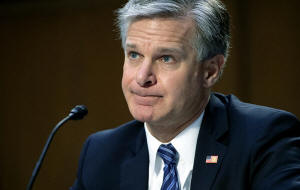FBI wrestles with a spike in sexual misconduct claims and male-dominated
culture
 Send a link to a friend
Send a link to a friend
 [January 31, 2025]
By JIM MUSTIAN [January 31, 2025]
By JIM MUSTIAN
WASHINGTON (AP) — The FBI has recorded a sharp spike in complaints that
its own agents and employees have engaged in sexual misconduct, ranging
from assault to harassment, despite a pledge by bureau leaders to
eliminate the longstanding problem.
An Associated Press investigation found the FBI has received nearly 300
allegations of sexual misconduct since the bureau announced in 2021 it
had launched an agency-wide crackdown.
The number marked a nearly 50% increase over complaints filed during the
preceding four-year period, according to bureau statistics, an increase
advocates and lawmakers described as a sign the bureau is struggling to
protect women in a male-dominated workplace. The FBI, for its part, said
the increase shows its reforms are making it easier to report
misconduct.
“Enough is enough,” Sen. Chuck Grassley, the Iowa Republican, told the
AP in a statement, adding he’ll be using his role as chairman of the
Senate Judiciary Committee “to get answers and root out further FBI
misconduct.” He blamed former FBI Director Christopher Wray for allowing
“the problem of sexual misconduct at the FBI to fester.”
FBI says spike due to crackdown
The FBI told AP it takes allegations of sexual misconduct “extremely
seriously” and acts upon them “expeditiously.” Bureau officials have
attributed the spike in complaints, in part, to their outreach efforts.
“We have come a long way in addressing it in various ways using all the
policy tools and legal means at our disposal,” the FBI said in a
statement, “but we absolutely have more to do in accomplishing a
meaningful and long-lasting cultural evolution that honors FBI Director
Wray’s commitment to eradicating sexual misconduct throughout the
organization.”

The FBI declined to provide details about the incidents, citing federal
privacy laws and internal guidelines. A monthslong AP investigation,
however, revealed that the incidents ranged from sexual assault to
agents paying for sex at massage parlors. Other allegations concerned
agents making inappropriate sexual comments at office functions or
commenting on co-workers’ appearances.
Some allegations were so serious they resulted in criminal
investigations or charges. Late last year, an FBI agent in Maryland,
Eduardo Valdivia, 40, was charged with sexually assaulting two women he
contacted through social media with a promise to give them free tattoos
and modeling work. His defense attorney, Robert Bonsib, said Valdivia
disputes “all allegations that he engaged in any criminal conduct and
expects to be cleared of all charges.”
The victims usually were agency employees, though others were women whom
agents came across during investigations or met socially. At least a
dozen sexual misconduct allegations involved supervisors, the AP found,
including at least one top agent.
The FBI determined more than half of the claims warranted internal
investigations, statistics show, though the bureau refused to disclose
how many resulted in terminations or other discipline.
Time of upheaval at FBI
The AP’s findings come at a moment of significant upheaval in the FBI.
Wray, a Republican appointed by then-President Donald Trump in 2017,
spent years under withering attacks for various investigations involving
Trump. Rather than be fired, Wray stepped down a day before Trump took
office on Jan. 20.
Trump has tapped Kash Patel, a strident supporter and former federal
prosecutor, to take over as the next director of the FBI. Patel's
spokesperson did not respond to requests for comment on how he would
tackle the issue of sexual misconduct. His confirmation hearing is
scheduled for Thursday.
While Trump and Patel have focused almost exclusively on claims of
political weaponization and biased probes in their promises to overhaul
the bureau, some lawmakers see the FBI’s record on sexual misconduct as
another compelling reason to clean house.
Last year, the Justice Department agreed to pay more than $22 million to
settle a class-action lawsuit alleging female FBI recruits had been
routinely harassed by instructors with sexually charged comments about
their breast size, false allegations of infidelity and the need to take
contraception “to control their moods.”

In interviews, more than a dozen current and former FBI agents said that
male-dominated culture would be the hardest to change. A former analyst
who once aspired to become the bureau’s first female director said she
intentionally gained 30 pounds hoping a harasser would stop “talking
about my body.”
She’d give away clothing that became triggering because she’d worn it
when she was harassed. “I would throw up in the office and have panic
attacks in the stairway whenever I saw him,” she recalled. “I came very
close to suicide twice.”
Victims, several of whom spoke on the condition they not be named, and
advocates told AP that many women remain reluctant to come forward for
fear of retaliation. They also lack confidence in the FBI’s
investigations and too often have seen agents, including high-ranking
ones, receive what they consider to be mild discipline. Others retire
before they can be punished.
FBI reports progress in reforms
The FBI has spent the last decade seeking to address its masculine
culture, in part by boosting its number of female agents. Nearly a
quarter of the bureau’s 13,700 agents are women, the bureau says, a
number slightly higher than the percentage of women in senior agent
ranks.
The FBI said it has made a series of reforms to its processes, training
and disciplinary reviews, including creating a 24/7 hotline to report
abuse. Those changes were implemented after the AP exposed a pattern of
senior FBI officials skirting discipline and retiring even after
internal inquiries determined they committed brazen misconduct,
including a senior official who harassed eight female subordinates.
It’s unclear whether that approach will continue under the Trump
administration, which has moved quickly to halt diversity, equity and
inclusion efforts across the federal government.
FBI misconduct investigations are shrouded in secrecy, and federal
privacy laws obscure the public’s view of which agents face discipline.
The government typically will not reveal where an incident took place,
even if the claims are substantiated. The AP relied on Freedom of
Information Act requests and interviews with nearly two dozen current
and former law enforcement officials to flesh out details about the
allegations and the resulting investigations.
For scores of allegations it did not investigate, the bureau said it
“lacked sufficient detail to predicate an investigation” or couldn’t
pinpoint a specific code of conduct violation. Other investigations
resulted in suspensions, transfers or firings, FBI officials said.

Lack of transparency makes it difficult to track discipline
The FBI does not disclose how it disciplines specific agents or
supervisors, but the AP reviewed internal records in a few cases that
showed how some were punished.
An unidentified supervisor, for example, was fired last year for
suggesting his female colleagues had become managers by performing sex
acts, the records show. And an FBI boss was suspended 60 days for
“unwelcome sexual conduct” at a work event.
In another case, the AP was not able to determine how a senior official
was disciplined even after he admitted to wrongdoing. The official, an
acting deputy assistant director, admitted he simulated anal sex on a
colleague while acting out a graphic joke about predatory priests in the
Roman Catholic Church, according to a 2023 report by the Justice
Department’s inspector general.
[to top of second column]
|

FBI Director Christopher Wray testifies during a Senate Judiciary
hearing about the Inspector General's report on the FBI's handling
of the Larry Nassar investigation on Capitol Hill, Wednesday, Sept.
15, 2021, in Washington. (Saul Loeb/Pool via AP, File)

“This is going to be bad,” the agent told colleagues before closing an
office door, according to the report. He then performed two wrestling
holds on the mortified coworker before landing his punch line.
The agent told investigators he only thrust his genitals once at the
colleague and never touched him. He admitted it was inappropriate, the
report says, telling investigators he “shouldn’t have told the joke in
an office setting.”
Misconduct cases are difficult to investigate
Sexual misconduct investigations can be difficult to resolve, and the
alleged behavior frequently happens behind closed doors.
In some instances, investigators were not able to substantiate
underlying allegations but nevertheless found agents violated related
policies or acted unprofessionally. That was the case involving
allegations that a supervisor raped an intoxicated woman in a Washington
hotel room — an accusation he denied.
The woman in that case reported to police that Shannon Fontenot met her
at a bar when she was already heavily intoxicated and, even after
noticing her wedding ring, invited her back to his room, where he opened
his wallet and showed her his FBI identification, records show.
Fontenot, an assistant special agent in charge of the FBI’s Springfield,
Illinois, field office, had been on assignment in Washington.
Testifying in a civil proceeding in which she unsuccessfully sought a
protective order against Fontenot, the woman described the night as
“every woman’s worst nightmare.” She said Fontenot appeared to be a
“safe person” and accept her limits, only to wait until she was drunk
enough to take advantage of her. She said she had more than a half-dozen
drinks and was so intoxicated she nearly walked into a wall.
“I think of FBI agents as our most elite law enforcement officers in the
country,” she testified in that civil case. “To use your position like
that is horrifically scary, and it is a huge betrayal of not only my
trust, but public trust. It’s awful.”
The AP is not naming the woman because it does not typically identify
people who say they are victims of sexual abuse.
Fontenot testified the encounter was entirely consensual and that the
woman did not appear intoxicated.
Federal prosecutors decided not to charge him, saying they could not
prove the woman’s claim. The Justice Department’s inspector general also
did not substantiate the sexual assault allegations but determined he
violated FBI rules in failing to disclose to his superiors that he was
under police investigation, government records show.

The FBI confirmed it suspended Fontenot for 10 days and later
transferred him to a non-supervisory role at its Washington
headquarters. It refused to say when he was transferred.
“The incident in question was thoroughly investigated, and it was
unequivocally determined that no form of sexual misconduct occurred,”
Fontenot’s attorney, Mark Rollins, told AP.
Highest ranks of FBI
Another misconduct investigation involved the agency’s then-No. 3
official who was accused by a subordinate of having “engaged in sexual
harassment,” the Justice Department’s inspector general reported.
The employee reported a raft of comments and actions by Jeff Sallet that
she described as violating the agency’s sexual harassment policies,
though investigators determined, in a lengthy report, that they were not
sexual in nature.
Among those the woman found most offensive: Sallet — who at the time
oversaw the bureau’s human resources branch — allegedly suggested her
mother was disappointed she wasn’t “barefoot and pregnant,” according to
the report. In another instance he invited her to join his friend's
“harem.”
In the moment insurrectionists bore down on the U.S. Capitol, the woman
alleged, Sallet looked down from his FBI office window onto Pennsylvania
Avenue and asked her, “How many of those guys are you thinking you’d
like to date. That isn’t your type is it?”
The woman also complained Sallet sexually harassed her in part by
suggesting they conduct a conference call together in his hotel room on
a work trip. “I felt that Sallet was pressuring me to be alone with him
in a hotel room,” she wrote in a declaration for an unrelated court case
by a former FBI agent seeking disciplinary records related to Sallet.
She added that "we did not need to be physically together for the
meeting and none of our co-workers were at the hotel.”
Sallet told the inspector general he did not recall where the call took
place but that it would not have been “strange or odd” to have such a
call in his hotel room.
Investigators concluded Sallet “violated the Department’s zero tolerance
policy on harassment by making five inappropriate comments to the
subordinate employee,” the inspector general said. “None of the
allegations involved unwelcome touching, and the independent
investigation did not find that any of the substantiated conduct was
sexual in nature.”

The report added that Sallet was also found to have acted
“unprofessionally” in accordance with FBI policies.
Sallet retired in 2021 before the investigation was completed. He has
denied the allegations and his attorney, Doug Brooks, noted he was
“cleared of all allegations of sexual harassment.”
“Jeff Sallet had an honorable and distinguished career at the FBI,”
Brooks wrote in an email, adding he had provided his “full cooperation”
to the inspector general investigation. “It is important to highlight
that there were never any allegations of unwelcome (or any) touching
made against Mr. Sallet.”
Advocates expressed frustration at the lack of transparency in such
cases and blasted the FBI for meting out relatively light punishment to
those it has found to have engaged in sexual misconduct.
“When high-ranking officials in particular face no meaningful
consequences for abusive conduct, it sends the message that anyone is
free to act with impunity,” said Stacey Young, co-founder of the DOJ
Gender Equality Network, an employee advocacy group that persuaded the
Justice Department to adopt a new department-wide sexual misconduct
policy.
Other advocates and female agents applauded the bureau for taking steps
to address sexual misconduct. But they said it needed to go further to
assure victims that their claims were being taken seriously.
Martha Johnson, a recently retired FBI agent who says she was sexually
assaulted by an agent many years ago while working in Chicago, said the
bureau’s internal processes for reporting sexual abuse have long been
set up to doubt and punish victims.
“They’re patting themselves on the back, but the environment is still
the same in that women are too afraid to even use a hotline,” she said.
“I’ve seen this scenario play out over and over for 20 years. They
didn’t change anything.”
___
Associated Press writers Eric Tucker and Joshua Goodman in Washington
contributed to this report.
All contents © copyright 2025 Associated Press. All rights reserved
 |